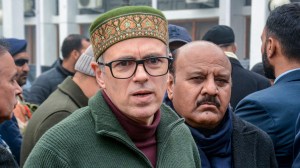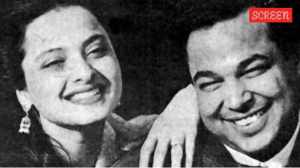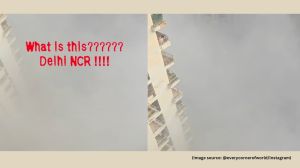A bench of the division bench of Justices Vinay G Joshi and Valmiki SA Menezes allowed appeals by the accused on a 2017 order of the trial court in Maharashtra’s Gadchiroli district that convicted them. The bench had closed the matter for judgement in September, last year, following directions from the Supreme Court.

The prosecution is likely to move the apex court, challenging the HC verdict.
Who along with GN Saibaba filed appeals and what was the case against them?
The appeals were filed by wheelchair-bound G N Saibaba, Mahesh Kariman Tirki, Hem Keshavdatta Mishra, Pandu Pora Narote and Prashant Rahi, who were sentenced to life imprisonment, and Vijay Tirki, who was sentenced to 10 years in jail by a special court in 2017.
They were convicted of alleged involvement in Maoist activities in March 2017. Five of the convicts, including Saibaba, were given life imprisonment; the sixth, Vijay Tirki, was given rigorous imprisonment for ten years as he was a first-time offender.
Saibaba and other accused persons were arrested between 2013 and 2014 by the Gadchiroli police in Maharashtra on allegations that they were members of the banned Communist Party of India (Maoist) and its frontal group Revolutionary Democratic Front.
As per police, many documents, a hard disk and pen drives were seized from Saibaba’s residence. The professor, who was placed under suspension by the university, was jailed till he was granted bail by the Bombay High Court on health grounds in May 2015. He was jailed again before being granted bail by the Supreme Court in September 2016.
Story continues below this ad
The family of the former professor, whose services were terminated by DU’s Ram Lal Anand College in 2021, had repeatedly demanded his release given his health condition, and as he is wheelchair-bound.
What did the High Court observe in October 2022 while discharging the accused?
On October 14, 2022, another bench of Justices Rohit B Deo (who resigned last year) and Anil Pansare set aside the convictions, ordering the release of all four men, including GN Saibaba, in the case.
The bench had said that due process in legal proceedings was required to be followed, and ruled that in the absence of a valid sanction under the Unlawful Activities (Prevention) Act (UAPA), the proceedings before the trial court were “null and void”.
Story continues below this ad
As per UAPA provisions, a court cannot take cognizance of an offence until sanction is received from the Central or state government. The sanction is to be given within a stipulated time, after considering the report by an independent authority that reviews the evidence and gives its recommendation.
Justice Deo-led bench had referred to the two sanctions granted by the Maharashtra government in the case. The first sanction of February 15, 2014, was against the five accused arrested in 2013 and the second sanction received was for the prosecution of Saibaba, received on April 6, 2015.
“While the war against terror must be waged by the State with unwavering resolve, and every legitimate weapon in the armoury must be deployed in the fight against terror, a civil democratic society can ill afford sacrificing the procedural safeguards legislatively provided, and which is an integral facet of the due process of law, at the altar of perceived peril to national security,” the bench had observed, adding that the sanction was not a “ritualistic formality”.
What made SC immediately suspend and later set aside the October 2022 HC verdict?
Story continues below this ad
On October 15, 2022, a day after the High Court verdict, a special Saturday sitting was held in the Supreme Court before the bench of Justices M R Shah (now retired) and Bela M Trivedi to decide the state government’s plea seeking a stay on the operation of HC judgement.
On the same day, the SC suspended the Nagpur bench verdict, holding that the high court had not gone into the merits of the case or “the seriousness and gravity of the offences for which the accused were convicted”.
The SC gave its prima facie opinion that “a detailed scrutiny is required so far as the impugned judgment and order passed by the high court is concerned”.
Thereafter, in April 2023, a bench of Justices M R Shah and C T Ravikumar of the Supreme Court set aside the Bombay High Court verdict that discharged Saibaba and others. The apex court remanded the matter back to the High Court to be heard afresh by a different bench within four months. Justice Joshi-led bench heard the appeals and closed them for judgment on September 7, 2023.
What did the Bombay HC hold on Tuesday?
Story continues below this ad
A division bench of Justices Vinay G Joshi and Valmiki SA Menezes of the Bombay High Court on Tuesday held that the prosecution failed to prove the case against the accused and that the sanction under the Unlawful Activities (Prevention) Act (UAPA) was null and void.
It noted the entire prosecution was vitiated on account of an invalid sanction to prosecute the accused. The court also noted that the trial that was held despite the violation of mandatory provisions of law amounted to a “failure of justice”.
It further pointed out that the prosecution failed to establish legal seizure of material and could not prove any incriminating material against the accused. Therefore, the bench set aside the trial court judgment convicting the accused persons as “being unsustainable in the hands of law”, allowed the appeals against the same and acquitted the accused.








































